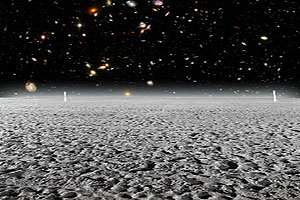 Are there more actually more stars in the sky, than there are
Are there more actually more stars in the sky, than there are
grains of sand on all the world's beaches?
I think most of us have heard that perennial estimate of the number of stars in the Universe being greater than all of the grains of sand in all of Earth’s beaches.
Sitting on Limantour Beach at Point Reyes awhile back, watching the waves slosh in and out, listening to gulls and feeling very lazy, I found myself looking about me at all that sand, and wondering how it could possibly be true. Reaching out, scooping up a mere handful of grains and letting--what?--a few hundred thousand of the would-be star proxies fall through my fingers, the notion seemed even more absurd.
Raising my eyes from the bit of the cosmos cupped in my hand and taking in the comparatively vast reaches of sand about me--a hundred or so feet between me and the waves, at least a mile or two of beach visible to the north, another stretch to the south, and who knows how many feet of depth beneath the surface? I simply couldn’t believe it. So, I pulled out my journal and started to write down some figures, working out the problem rationally.
So, is it true? Well, here's what I came up with:
Stars: Astronomers have estimated that there are about 200 billion stars in the Milky Way Galaxy. Galaxies come in many sizes, both much larger and considerably smaller than our home galaxy. I don't know what the average number of stars in each galaxy is, but for the sake of this calculation I chose a conservative 10 billion stars per galaxy. Astronomers have also estimated that there are between 50 billion and 100 billion galaxies in the Universe, based on observations made by the Hubble Space Telescope. Again being conservative, I chose the lower figure of 50 billion. So, with those numbers, I calculate a number of stars in the Universe at 10 billion times 50 billion, or 500 billion billion---or in exponential notation, 5 X 1020.
